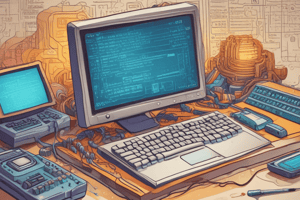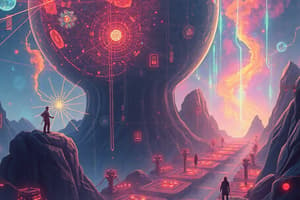Podcast
Questions and Answers
ما هو الجزء الأساسي في أي حاسوب والمسؤول عن جلب البيانات وإجراء العمليات عليها؟
ما هو الجزء الأساسي في أي حاسوب والمسؤول عن جلب البيانات وإجراء العمليات عليها؟
- الأنابيب الفراغية (Vacuum tubes)
- وحدة المعالجة المركزية (CPU) (correct)
- الذاكرة (Memory)
- الشرائح المتكاملة (Integrated chips)
ما هي المبدأ الذي ينص على تضاعف قوة معالجة الحاسوب كل سنتين تقريبًا بتكاليف تنخفض إلى النصف؟
ما هي المبدأ الذي ينص على تضاعف قوة معالجة الحاسوب كل سنتين تقريبًا بتكاليف تنخفض إلى النصف؟
- قانون مور (Moore's Law) (correct)
- الدوائر المتكاملة (Transistor circuits)
- المعالجة التسلسلية (Serial processing)
- الأنابيب الفراغية (Vacuum tubes)
ما هو دور الذاكرة في الحاسوب؟
ما هو دور الذاكرة في الحاسوب؟
- تخزين نتائج العمليات (correct)
- تنفيذ تعليمات البرنامج
- أداء العمليات الرياضية
- جلب البيانات
ما الذي قامت به آلات حواسيب الأيام الأولى خلال الحروب؟
ما الذي قامت به آلات حواسيب الأيام الأولى خلال الحروب؟
ما هي المبدأ الأساسي الذي قدمته آلات حواسيب الأيام الأولى لتطور الحواسيب الحديثة؟
ما هي المبدأ الأساسي الذي قدمته آلات حواسيب الأيام الأولى لتطور الحواسيب الحديثة؟
ما هو التطور التالي بعد أنابيب فراغية في تاريخ تطوير التقنية في عالم الحواسيب؟
ما هو التطور التالي بعد أنابيب فراغية في تاريخ تطوير التقنية في عالم الحواسيب؟
ما هو الغرض من استخدام أجهزة إدخال/إخراج في البرامج؟
ما هو الغرض من استخدام أجهزة إدخال/إخراج في البرامج؟
ما الفرق بين لغات البرمجة منخفضة المستوى والأعلى منه؟
ما الفرق بين لغات البرمجة منخفضة المستوى والأعلى منه؟
ما معنى مصطلح 'الخوارزميات' في علم الحاسوب؟
ما معنى مصطلح 'الخوارزميات' في علم الحاسوب؟
كيف تؤثر قدرة الحواسيب على معالجة مجموعات بيانات كبيرة على التطور العلمي؟
كيف تؤثر قدرة الحواسيب على معالجة مجموعات بيانات كبيرة على التطور العلمي؟
كيف غيرت الحواسيب طريقة تفاعل الناس مع بعضهم وكيفية عيشهم؟
كيف غيرت الحواسيب طريقة تفاعل الناس مع بعضهم وكيفية عيشهم؟
ما هو النصيب التقديري للحوسبة في مجتمعنا؟
ما هو النصيب التقديري للحوسبة في مجتمعنا؟
Flashcards are hidden until you start studying
Study Notes
A Gentle Introduction to Computing World
Computers have become such ubiquitous tools of daily life that it's often easy to take their existence for granted. But if we dig deeper into what makes these machines tick—from the smallest microprocessors in smartwatches to powerful supercomputers solving complex scientific problems—we uncover fascinating concepts with far-reaching implications. Let's embark on this gentle exploration of computers, beginning from their origins and touching upon essential aspects that make them indispensable parts of our world today.
Early Days of Computing
In the early days of computing, large vacuum tubes filled enormous rooms, crunching numbers for military calculations during WWII. These machines laid the groundwork for modern computers by providing foundational principles like serial processing and punched cards. As technology evolved through transistor circuits and integrated chips, Moore's Law, which states that computer processing power doubles approximately every two years while costs halve, gave rise to smaller and more powerful devices.
Anatomy of a Computer
At its core, a computer is composed of hardware components working together according to software instructions. At the heart of any machine lies the processor or central processing unit (CPU), responsible for fetching data, performing operations on it, and storing results in memory. Input/output (I/O) devices facilitate communication between users and programs via keyboards, mice, monitors, printers, and storage systems.
Programming Languages and Algorithms
Programmers express their ideas using programming languages that translate human commands into binary code comprehensible by processors. Popular languages range from low-level assembly for direct manipulation of CPU registers to high-level languages like Python and Java that abstract details away from programmers. To solve computational challenges, algorithms—specific rules and procedures used by computers to reach solutions—are employed, emphasizing efficiency and effectiveness.
Applications of Computing
From weather forecasting to movie production, astronaut training to social networking, computers touch almost all areas of society, transforming industries along the way. Their versatility and flexibility mean they can tackle huge datasets with ease, making them critical for scientific advancement, economic growth, and personal connectivity. Without doubt, computers have revolutionized the world, fundamentally changing how people work, learn, communicate, and live.
This brief primer on computers has only skimmed the surface of this vast field. For those eager to explore further, delving into specific aspects like networks, security, graphics, artificial intelligence, and quantum computing will reveal exciting new horizons in innovation and discovery. Whatever your passion may be, you'll find computers ready to support and inspire you!
Studying That Suits You
Use AI to generate personalized quizzes and flashcards to suit your learning preferences.




